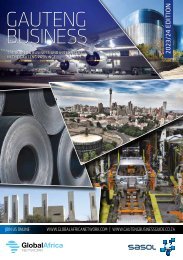Service - Leadership in Government - Issue 75
Create successful ePaper yourself
Turn your PDF publications into a flip-book with our unique Google optimized e-Paper software.
S<br />
service report<br />
2020 Global Cities Report<br />
of unemployment not seen <strong>in</strong> many parts of the world<br />
for some 70 years. With automation on the <strong>in</strong>crease,<br />
cities – once centres of economic opportunity – have to<br />
wrestle with its impact on employment, education and has generated, there is now a rare chance to make the<br />
tra<strong>in</strong><strong>in</strong>g programmes.<br />
shift from fix<strong>in</strong>g near-term problems to creat<strong>in</strong>g long-<br />
public value.<br />
Environmental pressure. A press<strong>in</strong>g topic is the evergrow<strong>in</strong>g<br />
peril of climate change. Pollution, water<br />
3last<strong>in</strong>g<br />
scarcity and exposure to frequent extreme weather<br />
3 VITAL AREAS TO DRIVE<br />
events will demand that cities f<strong>in</strong>d new ways to become<br />
secure, resilient and healthy places to live and work. INNOVATIVE PROGRESS<br />
1_Urban value creation. Structurally renew how cities create value<br />
CREATING WHAT’S NEXT<br />
for residents, bus<strong>in</strong>esses and communities.<br />
City leaders will need to make strategic choices and<br />
<strong>in</strong>vestments, which are likely to look very different from<br />
years past, if they are to emerge stronger and more<br />
resilient, while each city will necessarily adapt <strong>in</strong> its way<br />
to cater for variations <strong>in</strong> geography, demography and<br />
<strong>in</strong>dustrial strength, among other factors.<br />
personal agendas, and the tendency to consider value<br />
<strong>in</strong> f<strong>in</strong>ancial terms.<br />
Given the openness to change that the current crisis<br />
2_Global city connectedness. F<strong>in</strong>d new means of secur<strong>in</strong>g global flows of<br />
trade, <strong>in</strong>vestment, ideas and people <strong>in</strong> a fragmented world.<br />
3_The transformation of urban space. Reimag<strong>in</strong>e urban plann<strong>in</strong>g, us<strong>in</strong>g<br />
physical space and technology to make the environment more susta<strong>in</strong>able,<br />
resilient and <strong>in</strong>clusive.<br />
THE FUTURE OF URBAN VALUE CREATION<br />
Cities play a central role <strong>in</strong> advanc<strong>in</strong>g human progress<br />
and accelerat<strong>in</strong>g economic growth. At the core of their<br />
power are the benefits that emerge from cluster<strong>in</strong>g diverse<br />
groups of <strong>in</strong>dividuals, organisations and resources (also<br />
known as economies of agglomeration). In cities, human<br />
and f<strong>in</strong>ancial capital are concentrated, <strong>in</strong>frastructure is<br />
readily accessible, and deep specialisation is possible, all<br />
of which enhance productivity. Innovation is also fuelled<br />
by this proximity, and the ways <strong>in</strong> which it facilitates flow<br />
and exchange of ideas and gives residents a wide array<br />
of opportunities for participation, engagement and<br />
commerce. To the extent that these benefits outweigh<br />
the costs of city liv<strong>in</strong>g – such as higher rents, congestion<br />
and other <strong>in</strong>conveniences – cities create value <strong>in</strong> ways<br />
that can’t be recreated elsewhere. However, their ability<br />
to do so is now <strong>in</strong> jeopardy. This is particularly true for<br />
global cities.<br />
Global cities must not only renew but expand upon<br />
their unique value propositions – or their specific<br />
offer<strong>in</strong>g that attracts residents and bus<strong>in</strong>esses. This will<br />
require a deeper focus on creat<strong>in</strong>g public value – that<br />
is, value centred on the common good. Leaders have the<br />
opportunity to reverse trends that have underm<strong>in</strong>ed the<br />
stability, equity and value creation possibilities of cities<br />
for decades. Trends <strong>in</strong>clude the sw<strong>in</strong>g toward shortterm,<br />
reactive decision-mak<strong>in</strong>g at the expense of longterm<br />
vision and <strong>in</strong>vestment, captur<strong>in</strong>g policy processes<br />
by <strong>in</strong>terest groups, public adm<strong>in</strong>istrations driven by<br />
ORDER OF BUSINESS<br />
Redesign<strong>in</strong>g the urban value proposition. The first<br />
step is for public officials, residents and local bus<strong>in</strong>esses<br />
to candidly assess the current situation, identify<strong>in</strong>g<br />
immediate problems and long-term strategic challenges,<br />
and identify<strong>in</strong>g the trends that will most affect the<br />
city. Based on this assessment, city leaders must drive a<br />
process of collaborative <strong>in</strong>novation to redesign the city’s<br />
value proposition <strong>in</strong> ways that are robust with respect<br />
to future uncerta<strong>in</strong>ty and compell<strong>in</strong>gly reflective of<br />
the <strong>in</strong>terests and aspirations of all stakeholders. With<br />
a shared vision established, and the size and scale of<br />
the task determ<strong>in</strong>ed, challenges can be prioritised and<br />
an action plan developed. If this effort is genu<strong>in</strong>e,<br />
practical and transparent, commitment, <strong>in</strong>vestment and<br />
momentum will follow.<br />
Invest<strong>in</strong>g <strong>in</strong> future-oriented recovery. While there is<br />
no doubt that immediate public support is required to get<br />
citizens, bus<strong>in</strong>esses and communities back on their feet,<br />
the large-scale, ad hoc relief efforts that have prevailed<br />
throughout 2020 are not susta<strong>in</strong>able, nor are they<br />
sufficient to achieve full recovery <strong>in</strong> the months and years<br />
ahead. In addition, with previous cases of emergency<br />
economic relief hav<strong>in</strong>g been accused of benefitt<strong>in</strong>g the<br />
few at the expense of the many, the entire topic is now<br />
under heightened scrut<strong>in</strong>y.<br />
While conditional recovery aid is becom<strong>in</strong>g more<br />
common, it can often be, <strong>in</strong> many ways, punitive and<br />
past-oriented. Now, rather than focus<strong>in</strong>g on past<br />
Satellite image of<br />
New York at night.<br />
Now, rather than focus<strong>in</strong>g on past behaviours, recovery plans and programmes<br />
should focus on the future, and align the conditions for relief with cities’<br />
long-term strategic goals <strong>in</strong> ways that benefit society as a whole.<br />
28 | <strong>Service</strong> magaz<strong>in</strong>e


















